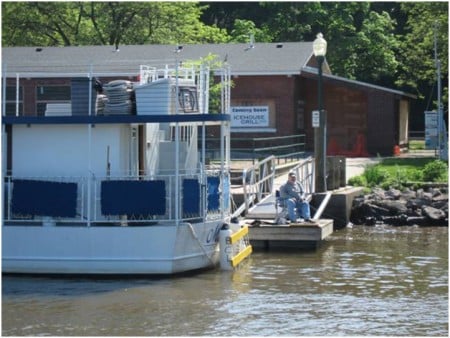Riverkeeper Wins Victory in Restoring Access to Hudson River at Poughkeepsie Dock

View more images on our Flickr site
FOR IMMEDIATE RELEASE
Contact: Tina Posterli, 516-526-9371, [email protected]
City of Poughkeepsie must give the public back their dock space, unimpeded by tour boat
Ossining/White Plains, NY – September 10, 2012 – Riverkeeper and a coalition of organizations and local citizens (collectively, Riverkeeper) announced a settlement agreement today in their lawsuit against the City of Poughkeepsie and its Mayor and Common Council (the City) for restricting public access to the Hudson River. The City decided to ignore serious concerns raised by community members who regularly use and enjoy the Waryas Park floating dock and shoreline, when it granted Seaway Navigation a license to moor and operate its Empire Cruises tour boat (the “Mystère”) from the public dock for a mere $2,500 per year. Because the Mystère is 60 feet long, and the original floating dock was 68 feet long, the public’s use of the floating dock was almost completely blocked off whenever the Mystère was moored. Riverkeeper was represented in this lawsuit by Pace Law School’s Environmental Litigation Clinic in White Plains.
Under the settlement agreement, the City must add a total of 60 additional feet of dock space to the Waryas Park floating dock beginning in spring 2013, and has already been required to install 20 of those additional feet of dock space this past August solely for the public’s use and access to the Hudson River. Seaway must also immediately begin docking the Mystère only at the southernmost portion of the floating dock so that all of the open dock space reserved for public use will be contiguous and closer to the boat launch ramp located just to the north of the dock.
“This case was never about preventing a tour boat from operating in Poughkeepsie,” explained Daniel Estrin, Supervising Attorney at the Pace Environmental Litigation Clinic and an environmental law professor at Pace Law School. “It was always about protecting, and then recovering, the free and convenient access to the Hudson River that the public lost when the City contracted away to the Mystère’s owner the right to use the public dock on public parkland at the expense of all other public uses.”
Paul Gallay, President and Hudson Riverkeeper, added, “Riverkeeper has always supported expanding public access to the Hudson River, and it is unfortunate it had to come to this. The way the City handled the operation of the Mystère blatantly violated the rights of the citizens who have used that floating dock and ramp for the last 35 years. Hopefully this will serve as an example of what not to do when considering projects at the river in the future.”
“Privatizing public parkland is never a good idea and defense of the people’s right to their own waterfront must remain a priority, said John Mylod, longtime environmental activist and lawsuit co-petitioner. “Settlement of Riverkeeper’s legal action is a huge victory for the community. It sends a powerful message that waterfront parkland facilities must be protected.”
Stuart Findlay, Ph.D., Senior Scientist at Cary Institute of Ecosystem Studies, which is a co-petitioner in the lawsuit, stated, “With the renewed public interest in the Hudson River and the continued requirement for scientific study, it is critical to maintain opportunities for the residents of the Hudson Valley and the research community to be able to get onto the river. Riverkeeper’s efforts to monitor and preserve safe and convenient access support both the appreciation of the Hudson and continual study of this iconic ecosystem.”
In June, 2011, Riverkeeper filed a lawsuit against the City after its decision to allow Seaway Navigation to use the Waryas Park dock as its “home port” to the exclusion of the public in violation of the public trust doctrine. The lawsuit also challenged the City’s deal with Seaway Navigation and Tours on the grounds that the City failed to conduct even a cursory environmental review in violation of the State Environmental Quality Review Act (SEQRA), and failed to comply with its own Waterfront Consistency Law.

